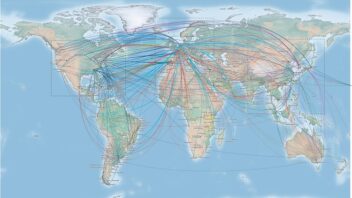Call for Papers for Networks of Manuscripts, Networks of Texts
This is a call for papers for Networks of Manuscripts, Networks of Texts, a two-day international conference 22-23 October 2020 organised by ‘Innovating Knowledge’ Project at the Huygens ING.
We welcome proposals in two categories: a) 30- minute full papers suitable for presenting completed or ongoing research; and b) 20-minute exploratory papers suitable for presenting newly started research or research proposals that are still being developed. The second category is particularly intended for early career researchers who are new to the field of network analysis and wish to have their ideas tested in front of an expert audience.
Proposals of between 300 and 500 words should be sent to Dr Evina Steinová at evina.steinova@huygens.knaw.nl by the end of April 2020. Authors of successful submissions will be informed by the end of June 2020 and encouraged to submit full papers in the following months so that they can be circulated in advance to stimulate a fruitful discussion.
In the last decade, methods of network analysis developed by social scientists have been increasingly applied to historical disciplines. As a result, we have seen the emergence of new bodies of researchers working with network analytical methods, such as Social Network Analysis Research in the Middle Ages (SNARMA), and new journals, such as the Journal of Historical Network Research (JHNR). Researchers studying premodern manuscript cultures have been actively engaged with this new methodological trend. Completed and ongoing projects make it clear that the methods of network analysis can be applied to the study of premodern manuscripts and manuscript texts and yield relevant and exciting results. However, it is also clear that scholars of premodern written cultures face unique challenges when engaging with network analysis stemming from the nature of the material they are working with. Not all methods devised by social scientists are applicable to manuscripts and texts, while in other cases, established methods need to be adapted to and reinvented for new needs. Working with large corpora of manuscripts and texts, and approaching premodern written cultures from a quantitative perspective bring their unique challenges to fields that have a long tradition of looking at their subjects in small quantities and with a qualitative lens. As any young methodological subfield, the study of premodern manuscripts and manuscript texts using network analysis is still in an exploratory stage, with theoretical frameworks being forged and methods tested.
This conference aims to bring together researchers applying network analysis to premodern manuscripts and manuscript texts. We would like to invite researchers working in all fields of premodern manuscript studies and researchers working with manuscript texts who engage with the methods and concepts stemming from network analysis. Key topics include, but are not limited to, the following:
- Theoretical reflections on the challenges and advantages of applying network analysis, including social network analysis, to premodern written cultures;
- Application of network analysis to corpora of premodern manuscripts and texts;
- Network analysis as a means of understanding the circulation of texts and transmission of knowledge in the premodern period;
- Quantitative study of networks of medieval book exchange and letter exchange;
- Network analysis as a tool of textual criticism and text editing;
- Network graphs as stemmata of texts and genres with complex textual history;
- Networks of co-citation of premodern authors and authoritative texts;
- Networks of co-occurrence and compilation of texts in medieval manuscripts;
- Network analysis as a tool for the study of annotation practices and commentary traditions in premodern manuscript cultures;
- Network analysis as a tool for the study of citation and reception in premodern manuscript cultures.
A keynote by Matteo Valleriani (Max Planck Institute for the History of Science, Berlin/Technische Universität Berlin/University of Tel Aviv) is included on the first day of the conference. The language of the conference will be English. We offer to cover the accommodation costs for two nights and provide lunches. We also intend to provide a small number of bursaries to speakers who may need travel assistance.
You can download the PDF here. For further information, contact Dr Evina Steinová at evina.steinova@huygens.knaw.nl.




